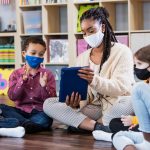
For educators, families, and communities, April is bringing a welcome sign of hope to a year of unchartered challenges as political unrest, COVID-19, social and racial disparities, and violence have disrupted and dismantled our schools’ traditional approach to education. The appointment of Miguel A. Cardona as the 12th Secretary of Education and the passing of the American Rescue Plan of 2021 does make it feel like spring, in fact, has sprung. The possibility of equitable school environments for our nation’s children appears tangible, however, recovery must attend to more than filling holes with intent to return to a “new normal.”
Students desperately need support as they try to overcome current challenges to academic learning, physical health, and social-emotional connection. Meanwhile, school leaders must focus on coordinating policies and practices that put equitable structures in place for every child. While the necessary federal leadership and funding provide necessary first steps to tackling multiple points of support to the education infrastructure, we propose that schools reopen not with a “new normal,” but a “better normal” — one where we carry out only a few highly effective actions really well.
“As education leaders navigate our emerging new reality, it is critical that their decisions, and guidance that informs their decisions, be effective and usable. The evolving education environment demands nimble decision-making that relies on the best available knowledge,” say Neag School’s George Sugai and Sandra Chafouleas.
Lisa Sanetti said the “levels of heightened stress and waves of uncertainty” adults have experienced during this past year have very real effects on children. “I’d say that it’s not possible to focus on the children without making sure that the adults around them are healthy as well.”
Sandra Chafouleas, a professor of educational psychology at the University of Connecticut, said most schools she’s researched do academic and health screenings, such as for lice. “But when we looked at what people were doing in the social-emotional-behavioral space, only about a third of districts (nationally) said they were engaging in that kind of practice,” she said.
“We have to start thinking about the whole student,” said Jason Irizarry, dean of the Neag School of Education at the University of Connecticut. “Having a more holistic understanding of our students and their communities is central to reaching all students.”
“There has to be some happy medium there between finding assessments that will provide reliable information for parents, students, and teachers,” said Morgaen Donaldson, an associate professor at the University of Connecticut who researches educator evaluations, “and then having teachers set goals based on those assessments that are smart, realistic and context-specific, and can be part of their evaluation.”
With the pandemic projected to set women back a decade in the workplace, we take listener calls and talk with two working mothers about how their lives have been affected this past year. We’re joined by Quiana Agbai, a Boston parent, entrepreneur, and author of the blog and Instagram account “Harlem Love Birds,” and Jennie Weiner, a Somerville parent and associate professor of educational leadership at the University of Connecticut.
Neag School faculty members and other colleagues are co-authors of a new study, recently published in the Journal of Postsecondary Education and Disability, that examined the impact of the rapid transition to online learning during the spring 2020 academic semester on college students with disabilities. The researchers conducted a national survey of more than 340 students in both two and four-year programs to measure the perceptions of college students with disabilities about their experiences.
In this month’s episode of the NEPC Talks Education podcast, NEPC Researcher Christopher Saldaña interviews Drs. Bruce Baker and Preston Green, leading experts in K-12 school finance and school choice policy. Baker is a professor in the Department of Educational Theory, Policy, and Administration at Rutgers University. Green is the John and Maria Neag Professor of Urban Education at the Neag School of Education at the University of Connecticut.
From a young age, Madison Corlett ’16 (ED), ’17 MA, was excited about helping others, raising money through lemonade stands and other fundraisers, then donating the money to local causes.



